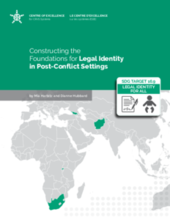Abstract
Despite mounting evidence of the need for people to have trusted and trustworthy identity credentials, little attention has been paid to the key determinants of an identity management system that establishes a person’s unique legal identity and issues reliable official identity credentials. Also overlooked is a country’s ability to register and give legal identity to everyone who lives within its borders, regardless of citizenship status.
This paper aims to contribute to the achievement of Target 16.9 under Sustainable Development Goal 16 by analyzing the role of the civil register and the legal underpinnings for identity in four countries: Afghanistan, Georgia, Rwanda, and South Africa. It describes institutional and operational models in each country that support universal registration of births, deaths, and other vital events. Specifically, it describes the legal frameworks for civil registration (sovereign responsibility), institutional and administrative arrangements, registration of undocumented adults, marginalized populations and refugees, and legal and administrative capacity to handle adverse situations. It concludes by noting some areas needing particular attention.
While the four countries are at different stages of maturity of their identity management systems, they are concerned with many of the same issues, such as increasing the coverage of civil registration, improving civil registration statistics, and advancing the efficiency, functionality, and coverage of their national identity management arrangements. Implicitly, the countries are attempting to provide all citizens, residents, and refugees with a legal identity, but in practice some of the countries fall short. The four countries have experienced, or are experiencing, internal conflict of varying degrees, from South Africa’s repressive apartheid regime to Afghanistan’s ongoing armed struggle, with Rwanda’s genocide as a defining moment for reconciliation, and Georgia’s latent ethnic frictions. Thus, despite the many differences between these four countries, they are instructive as a spectrum of approaches to identification management in post-conflict settings, with a number of commonalities.
Key findings from the study relevant to children's care include:
- In Afghanistan,
- There are legal procedures for some instances where documentation is lacking, such as the absence of a verifiable date of birth or registration of children of unknown parents, but it is difficult to determine how accessible these are in practice.
- A tazkera can be issued right after birth registration, and the law gives a child’s guardian or lawful relative a duty to obtain a national identity card for the child before he or she reaches the age of 3 months. It is not clear that this duty is strictly enforced.
- Since descent is the primary basis for citizenship, the family relations that are recorded in civil registration records are important. Recent decisions to record information about mothers on birth certificates and tazkera for the first time are significant, although many gender challenges remain.
- In Georgia,
- A child whose parents are both unknown “shall be deemed to be a Georgian citizen unless proved otherwise” (Art. 11).
- Children in certain circumstances also have a right to Georgian citizenship by means of the regular procedure; this applies to a minor who did not acquire citizenship by birth but was born to a Georgian citizen, a minor adopted by a Georgian citizen, and a minor born in Georgia who is stateless or has refugee status and has lived in Georgia for five years
- In Rwanda,
- A child born in Rwanda whose parents are unknown or are themselves stateless is Rwandan by birth, as is a child born in Rwanda who cannot acquire the nationality of one of his or her parents. A newborn found in Rwanda is considered to have been born in Rwanda in the absence of proof to the contrary
- Adoption by a Rwandan citizen leads automatically to Rwanda citizenship. This is the case for a minor child who has a foreign nationality or is stateless. The requirements are the child’s birth certificate and certificate of adoption, plus the identity card of the adopting parent.
- The National Population Register provides for different registers for four categories of people: citizens, foreigners, children with unknown parents, and adopted children
- In South Africa,
- The current citizenship legislation provides for three categories of citizenship: based on birth (which covers both jus soli and jus sanguinis), descent (in respect of adopted children), and naturalization.
- The duty to provide the notice of birth falls on one or both parents or, if they are both deceased, on the next of kin or the child’s legal guardian.
- Even though birth registration was one of the first services to resume after the most restrictive lockdown period ended, it was estimated that there was a backlog of nearly 100,000 children born during the lockdown without birth certificates. This was particularly problematic during the period when families were feeling the economic impact of COVID-19, as a parent cannot access a child support grant for a child whose birth is not registered. (A Department of Home Affairs official stated that the South African Social Security Agency allows children to be registered for a grant for three months while a birth certificate is pending, but this was not specified in the relevant regulations)
- Social grants are distributed under the Social Assistance Act 13 of 2004. Regulation 11 of the Regulations relating to the Application for and Payment of Social Assistance and the Requirements or Conditions in respect of Eligibility for Social Assistance, issued in GN R898 of 2008 as amended, states that an application for a social grant must include an identity document of the applicant and of his or her spouse and, in the case of a child support grant, a care dependency grant, or a foster child grant, an identity document or a valid birth certificate of each child for whom an application for a social grant is made.
View also: Webinar Recording

